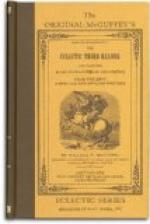mice cri’ses ter’mi ni chil’dren neb’u lae a lum’ni ver’te brae stra’ta syn op’ses geese { kine, cows } { staves, staffs} { broth’ers,breth’ren } { pease, peas} { dies, dice}
Lesson 139.
Ing signifies continuing to; as talking, continuing to talk. The following words, in taking their suffix, double the final letter. The last letter is doubled when the word ends with a single consonant preceded by a single vowel.
plan’ning win’ning stop’ping a bet’ting fret’ting blot’ting gun’ning re bel’ling bid’ding rob’bing shut’ting o mit’ting
Other words ending with consonants, which do not double the final letter.
act’ing fail’ing mean’ing ex pand’ing land’ing rain’ing coax’ing con sent’ing build’ing sail’ing suit’ing vis’it ing
Lesson 140.
Words ending in e silent, generally drop the e in adding ing.
mak’ing seiz’ing rul’ing ex pir’ing nam’ing forc’ing lin’ing re fus’ing plagu’ing hedg’ing squeez’ing in trigu’ing ach’ing writ’ing schem’ing alleg’ing
The final e is retained when it is necessary to prevent a change of pronunciation, or to maintain the identity of a word.
hoe’ing shoe’ing change’a ble toe’ing singe’ing trace’able tinge’ing dye’ing peace’a ble foe’man blue’ness charge’a ble
Lesson 141.
Ed, as a suffix, generally signifies did. In words like the following the e in ed is silent, and the wards, though of two and three syllables, are pronounced in one and two.
blazed wedged boiled be reaved drained solved coiled be sieged’ hailed called soiled blas phemed’ lamed hauled bowed ac quired’ paved mauled crowned con trol1ed’ stowed warmed plowed a bused’ saved warned roused ac cused’ feared warped scoured com muned’ flowed proved soured con fused’ glued shoved dodged de coyed’ begged loved filled en joyed’
Lesson 142.
In words like the following, ed is pronounced as t; and, although of two and three syllables, the words are pronounced in one and two.
graced fixed es caped’ at tacked’ scraped mixed em braced’ con fessed’ cracked boxed en grossed’ op pressed’
In other words formed by the affix ed, the last letter is doubled in words of one syllable, or in words accented on the last syllable, when they end with a single consonant preceded by a single vowel; as, wed, wed’ded. If the word ends in any other consonant than d or t, the e in ed becomes silent, and the two syllables become one; as, hem, hemmed, pronounced hemd.
jut’ted shunned com pelled o mit’ted fret’ted tapped e quipped’ im bed’ded fit’ted rubbed de murred’ com mit’ted
Lesson 143.
Words not included in the ahove rule, do not double the final consonant.




